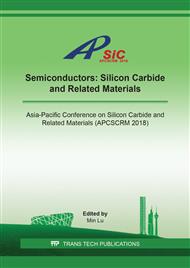[1]
H. Matsunami and T. Kimoto, Step-controlled epitaxial growth of SiC: high quality homoepitaxy. Mat Sci Eng R Rep. 20(1997)125–166.
DOI: 10.1016/s0927-796x(97)00005-3
Google Scholar
[2]
L. Dong, G. S. Sun, J. Yu, et al. Characterization of Obtuse Triangular Defects on 4H-SiC 4° off-Axis Epitaxial Wafers. Chin. Phys. Lett. 30(9) (2013)96105.
DOI: 10.1088/0256-307x/30/9/096105
Google Scholar
[3]
T. Kimoto, Material science and device physics in SiC technology for high-voltage power devices. Japanese Journal of Applied Physics 54(4) (2015)040103.
DOI: 10.7567/jjap.54.040103
Google Scholar
[4]
Y. X. Niu, X. Y. Tang, R. X. Jia et al, Influence of Triangle Structure Defect on the Carrier Lifetime of the 4H-SiC Ultra-Thick Epilayer, Chin. Phys.Lett. 35(2018) 077103.
DOI: 10.1088/0256-307x/35/7/077103
Google Scholar
[5]
T. Ueda, H. Nishino, and H. Matsunami, Crystal growth of sic by step-controlled epitaxy. Journal of Crystal Growth, 104(3) (1990) 695-700.
DOI: 10.1016/0022-0248(90)90013-b
Google Scholar
[6]
T. Kimoto, and H. Matsunami, Surface kinetics of adatoms in vapor phase epitaxial growth of sic on 6H-SiC {0001} vicinal surfaces. Journal of Applied Physics, 75(2) (1994)850-859.
DOI: 10.1063/1.356439
Google Scholar
[7]
J.A Powell, J.B. Petit, J.H. Edgar et al, Investigation of the growth of 3c-sic and 6h-sic films on low-tilt-angle vicinal (0001) 6H-SiC wafers. Applied Physics Letters, 59(3) (1991) 333-335.
DOI: 10.1063/1.105587
Google Scholar
[8]
A.O. Konstantinov, C. Hallin, O. Kordina, and E. Janzén, Effect of vapor composition on polytype homogeneity of epitaxial silicon carbide. Journal of Applied Physics, 80(10) (1996) 5704-5712.
DOI: 10.1063/1.363622
Google Scholar
[9]
H. Das, G. Melnychuk and Y. Koshka, Triangular defects in the low-temperature halo-carbon homoepitaxial growth of 4H-SiC. Journal of Crystal Growth, 312(12) (2010)1912-1919.
DOI: 10.1016/j.jcrysgro.2010.03.022
Google Scholar
[10]
A. Shrivastava, P. Muzykov, J.D. Caldwell, and T.S. Sudarshan. Study of triangular defects and inverted pyramids in 4H-SiC 4° off-cut (0 0 0 1) Si face epilayers. Journal of Crystal Growth, 310(2008)4443–4450.
DOI: 10.1016/j.jcrysgro.2008.07.102
Google Scholar
[11]
G. Chung, M.J. Loboda, J. Zhang et al, 4h-sic epitaxy with very smooth surface and low basal plane dislocation on 4 degree off-axis wafer. Materials Science Forum, 679-680(2011)123-126.
DOI: 10.4028/www.scientific.net/msf.679-680.123
Google Scholar
[12]
H. Das, S. Sunkari, T. Oldham, J. Rodgers, J. Casady, Uniformity and morphology of 10x100mm 4 off-axis 4H-SiC epitaxial layers and their effect on device performance, Mat. Sci. Forum 740-742 (2013) 221-224.
DOI: 10.4028/www.scientific.net/msf.740-742.221
Google Scholar
[13]
M. Yazdanfar, I.G. Ivanov, H. Pedersen, O. Kordina, Reduction of structural defects in thick 4H-SiC epitaxial layers grown on 4° off-axis substrate, Journal of Applied Physics,113(2013) 223502-223508.
DOI: 10.1063/1.4809928
Google Scholar
[14]
A.Q. Konstantinov, Q. Wahab, N. Nordell, U. Lindefelt, Ionization rates and critical fields in 4H silicon carbide, Appl. Phys. Lett. 71 (1997) 90–92.
DOI: 10.1063/1.119478
Google Scholar
[15]
B. Jayant Baliga, Fundamentals of Power Semiconductor Devices, Springer, US, (2008).
Google Scholar
[16]
K. Wada, T. Kimoto, K. Nishikawa, et al. Epitaxial growth of 4H-SiC on 4° off-axis (0001) and (000-1) substrates by hot-wall chemical vapor deposition. Journal of Crystal Growth 291 (2006) 370–374.
DOI: 10.1016/j.jcrysgro.2006.03.039
Google Scholar
[17]
M.B.J. Wijesundara, R. Azevedo, Silicon Carbide Microsystems for Harsh Environments, Springer, New York, 2011, 33.
Google Scholar
[18]
M. Sasaki, K. Tamura, H. Sako, M. Kitabatake, et al, Analysis on generation of localized step-bunchings on 4h-sic(0001)si face by synchrotron x-ray topography. Materials Science Forum, 778-780(2014)398-401.
DOI: 10.4028/www.scientific.net/msf.778-780.398
Google Scholar
[19]
H. Sako, T. Yamashita, K. Tamura, et al, Microstructural Analysis of Damaged Layer Introduced during Chemo-Mechanical Polishing. Mater. Sci. Forum 778–780(2014)370-373.
DOI: 10.4028/www.scientific.net/msf.778-780.370
Google Scholar
[20]
M. Sasaki, H. Matsuhata, K. Tamura, et al, Synchrotron X-ray topography analysis of local damage occurring during polishing of 4H-SiC wafers. Jpn. J. Appl. Phys. 54(2015) 091301.
DOI: 10.7567/jjap.54.091301
Google Scholar
[21]
J. A. Powell, J. B. Petit, J. H. Edgar, et al. Investigation of the Growth of 3C-SiC and 6H-SiC Films on Low-Tilt-Angle Vicinal (0001) 6H-SiC Wafers. Appl. Phys. Lett. 59(1991) 333-335.
DOI: 10.1063/1.105587
Google Scholar


